
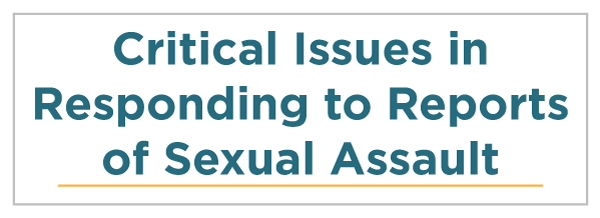 |
 |
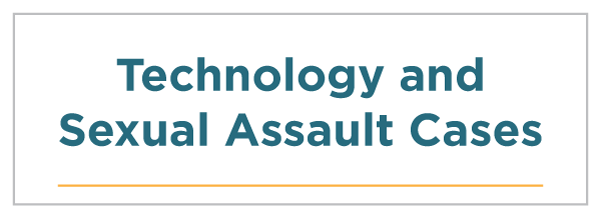 |
 |
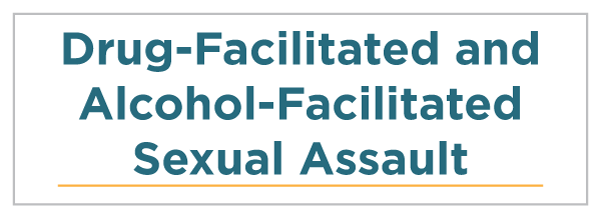 |
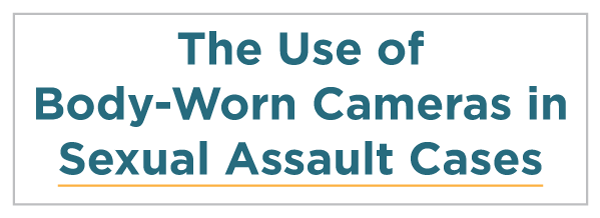 |
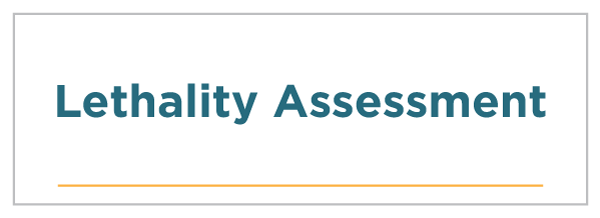 |
 |
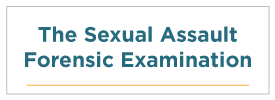 |
 |
 |
 |
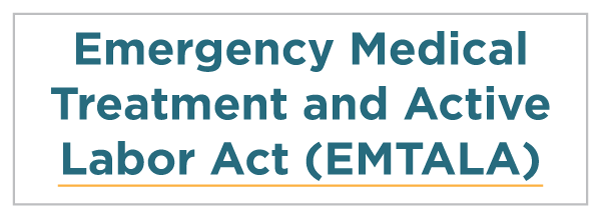 |
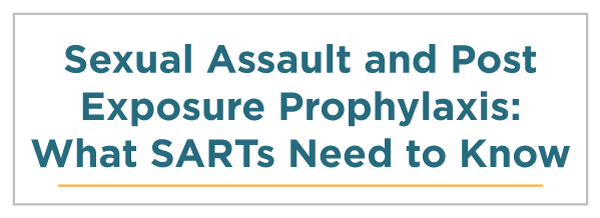 |
 |
Drug-Facilitated and Alcohol-Facilitated Sexual Assault
SART members should understand that alcohol-facilitated sexual assault (AFSA) or drug-facilitated sexual assault (DFSA) occurs when a victim’s intoxication from drugs or alcohol impairs their cognitive and physical functions to the extent that they are unable to consent to sexual activity. A victim may not be able to communicate unwillingness to engage in sexual activity, understand what is happening, or have the ability to control their own conduct. [41]
Laws across the United States addressing drug or alcohol-facilitated sexual assault vary and do not consistently define the level of intoxication that prevents a victim from consenting to sexual activity.
According to Guidelines for Medico-Legal Care for Victims of Sexual Violence, drugs or alcohol may be involved with those victims who present with any of the following — [42]
- impaired conscious state, memory loss, disorientation, or confusion,
- impairment of speech or coordination,
- unexplained signs of trauma, particularly genital trauma,
- apparent intoxication that does not correspond to reported alcohol consumption,
- unexplained loss or rearrangement of clothing, and
- talk about having an “out-of-body” experience.
Both drugs and alcohol are used to create or exploit vulnerabilities in victims. People who commit DFSA or AFSA may take advantage of a person who has used drugs or alcohol voluntarily, [43] may administer drugs or supply alcohol forcefully, or give drugs or alcohol without the victim’s knowledge in order to facilitate sexual assault.
Victims who voluntarily drink alcohol and take drugs often experience feelings of guilt and worry they will not be believed or taken seriously. In one study of 388 women who had experienced an AFSA, almost half (47 percent) reported minimizing, victim-blaming, or stigmatizing responses when they disclosed their victimization. [44] In a study of 311 men, over 45% of respondents who reported sexual assault victimization indicated that at least one sexual assault involved intoxication. [45] In another study, over a third of DFSA or AFSA victims who declined to report their sexual assaults feared that law enforcement and criminal justice professionals would treat them poorly. [46]
Read on for more resources and information:
- What SARTs need to know about DFSA and AFSA
- Toxicology Screening
- Criminal Justice Implications in DFSA or AFSA Cases
What SARTs Need to Know About DFSA and AFSA
Expert Interview - Tips for First Responders in Drug Facilitated Sexual Assault (DFSA) Cases - Dr. Marc LeBeau by End Violence Against Women International, 2017. Retrieved from LINK Provided with permission.
The National Intimate Partner and Sexual Violence Survey (NISVS) found that over 11 million women and over 1 million men have experienced alcohol- or drug-facilitated rape in their lifetime. [47] Of women who have experienced AFSA or DFSA, over 58 percent were victimized by someone they knew. [48]
Research has shown that many victims of sexual assault do not report their victimization to the police or seek out services. Research suggests that women who experience DFSA or AFSA are less likely than other victims to report their assault to law enforcement, seek crisis services, or seek medical care. [49]
All SART members should be aware that intoxicated individuals are unable to give or withhold consent if their cognitive or physical functions are impaired to such an extent that they cannot say “yes” or “no,” or decide with a clear mind whether or not to have sex. SART members should be aware of their jurisdiction’s statues addressing DFSA and AFSA and what constitutes criminal impairment.
It is essential for SARTs to develop common language to define DFSA and AFSA. When talking about DFSA, the term “drug” may include illegal substances, prescription drugs, over-the-counter medications, or alcohol. The term “drug” may also include psychotropic substances that have not been specifically outlawed or designated for medical use (sometimes called “designer drugs” or “research chemicals”).
Some jurisdictions have different protocols for suspected DFSA involving illicit substances and AFSA. This distinction may affect what is or is not routinely collected during the medical forensic examination. The U.S. Department of Justice National Best Practices for Sexual Assault Kits: A Multidisciplinary Approach outlines specific recommendations for medical exam facilities in cases where the victim cannot provide a history. [50]
It is important that all members of a SART understand what is meant by “drug” in their jurisdiction and are able to articulate when and why evidence related to suspected DFSA or AFSA may or may not be collected.
Since the ability to detect particular chemicals and the timeframe they are metabolized in the body differs, it is important to know how and when to test. SARTs can receive training on which drugs, including over-the-counter, prescribed, and illicit substances, are accessible in their communities, their common effects on individuals, if it is possible to test, how and when to test (in cases where the victim consents), and the many factors that may affect the results of those tests.
Typically, the results of any toxicology test for drugs or a blood alcohol test will not, in itself, prove that a sexual assault occurred. SARTs should stay up to date on legislation around substances, specifically the legalization of marijuana, as this is an emerging change that may impact sexual assault cases.
Toxicology results do not necessarily prove or disprove that a DFSA occurred. While DFSA blood and urine panels test for a wide variety of substances, [51] they may not test for or detect all drugs. Negative toxicological results in DFSA cases may be due to one or more of the following factors:
- Timeframe of the sample collection, as some substances are only detectable in blood and urine samples for short periods of time
- Routine testing regimens where laboratories test for specific substances but not others
- Laboratory analytical methods that cannot detect certain substances in low concentrations, such as immunoassays and enzymatic techniques
- A victim’s voluntary or involuntary consumption of a substance that is unknown to the laboratory or beyond its capacity to detect, such as “designer drugs” or drugs that demonstrate high potency at very low concentrations
- Breakdown of drugs during storage of a blood or urine sample [52]
- Type and dosage of the drug, the victim’s body size and body metabolism rates, whether the victim has previously urinated, and if and when the victim consumed food [53]
- Improper collection, handling, and storage of the samples [54]
To ensure appropriate collection, see the Guidelines for the Forensic Analysis of Drugs Facilitating Sexual Assault and Other Criminal Acts and The U.S. Department of Justice National Best Practices for Sexual Assault Kits: A Multidisciplinary Approach.
Although toxicology test results are not provided directly to defense attorneys from crime labs, test results will be available to prosecution and defense as part of discovery during trial. Victims should be informed that results could become public knowledge if the sexual assault is reported. [55] Victims should also be given access to the results of any toxicology screening, including information on how to obtain a copy of the results. [56]
A Simplified Guide to Forensic Drug Chemistry, a website developed by the NFSTC and funded by the BJA, provides additional information. The website includes the following content:
- Introduction
- Principles
- Applications
- How It’s Done
- Frequently Asked Questions (FAQs)
- Common Terms
- Resources & References
Users can also download a PDF version of the content.
SART members can read this resource information to better understand technical information, including toxicology results. Toxicologists or forensic scientists can share this information prior to SART training on the topic. Understanding this information may help all SART members understand the impact of toxicology results and why they vary, and explain these concepts to victims, communities, and juries.
Toxicology Screening
Expert Interview - Tips for Investigators in Drug Facilitated Sexual Assault (DFSA) Cases - Dr. Marc LeBeau by End Violence Against Women International, 2017. Retrieved from LINK Provided with permission.
A National Protocol for Sexual Assault Medical Forensic Examinations: Adults/Adolescents, Second Edition provides recommendations for jurisdictions and responders to facilitate response in suspected AFSA and DFSA. The National Protocol recommends against routine toxicology testing, but under specific circumstances, informed consent should be attained to collect urine or blood samples. [57]
The U.S. Department of Justice National Best Practices for Sexual Assault Kits: A Multidisciplinary Approach provides complimentary advice on collecting evidence from victims who cannot provide a history of the assault.
A National Protocol for Sexual Assault Medical Forensic Examinations: Adults/Adolescents, Second Edition recommends that testing may be indicated if — [58]
- a patient’s medical condition appears to warrant toxicology screening for optimal care —for example, if the patient is drowsy, feels fatigued or has light-headedness, dizziness, memory loss, impaired motor skills, or severe intoxication;
- a patient or accompanying people state the patient was or may have been drugged; or
- a patient is unable to recall events and suspects a drug may have been used.
Samples should be collected with informed consent, as soon as possible, even if victims are undecided about reporting to law enforcement.
To provide informed consent, victims need to understand the following — [59]
- the purpose of the testing and the scope of confidentiality of the results;
- the ability to detect and identify drugs and alcohol depends on the collection of urine or blood within a limited time period;
- testing does not guarantee drugs used to facilitate an assault will be detected;
- testing may or may not be limited to drugs commonly used to facilitate sexual assault and may reveal other drugs or alcohol that the victim may have ingested voluntarily;
- whether follow-up treatment is necessary if testing reveals the presence of drugs;
- test results showing voluntary use of drugs or alcohol may be available for the defense and used to attempt to discredit victims or to question their ability to accurately perceive the events;
- whether there is a local prosecution practice of charging sexual assault victims with a crime for illegal voluntary drug or alcohol use;
- declining testing may negatively impact investigation and prosecution;
- who will pay for toxicology testing;
- when and how the victim can obtain test results; and
- whether toxicology testing can happen without a report to law enforcement.
Urine samples allow for a longer detection time than blood samples. The sooner a urine specimen is obtained after the assault, the greater the chances of detecting drugs before they degrade or are eliminated from the body. Best practices for short- and long-term storage options for urine and other specimens are described in The U.S. Department of Justice National Best Practices for Sexual Assault Kits: A Multidisciplinary Approach.
Additional information on toxicology testing, is included in A National Protocol for Sexual Assault Medical Forensic Examinations: Adults/Adolescents, Second Edition.
Criminal Justice Implications in DFSA or AFSA Cases
Expert Interview - Information for Investigators in Alcohol Facilitated Sexual Assault Cases - Teresa Scalzo by End Violence Against Women International, 2018. Retrieved from LINK Provided with permission.
There are unique aspects to DFSA or AFSA that require tailored SART strategies during the criminal justice process. Victims may not be able to provide a complete account of the assault and may only have suspicions or have heard rumors that something happened to them.
Due to the guilt and stigma a victim may feel, their willingness to participate in prosecution will be affected by how SART members interact with them and respond to the use of drugs and alcohol, whether voluntary or not. A trauma-informed interview may help with locating more evidence and assist with closure in the future.
SART members should also understand that voluntary drug or alcohol consumption by a victim can affect a prosecutor’s charging decisions. According to A National Protocol for Sexual Assault Medical Forensic Examinations: Adults/Adolescents, Second Edition, [60] “Voluntary drug and/or alcohol use by patients during this period should not diminish the perceived seriousness of the assault. Law enforcement officers and prosecutors should guard against disqualifying cases in which patients voluntarily used illegal drugs or used alcohol (whether legal or illegal use).”
The federal Drug-Induced Rape Prevention and Punishment Act of 1996 provides penalties of up to 20 years imprisonment and fines for persons who intend to commit sexual assault by distributing a controlled substance to another individual without that individual's knowledge.
When working on a DFSA or AFSA case, SART members can prepare the victim, in a trauma-informed way, for possible scenarios related to prosecution, particularly around how defense attorneys might state their case. Preparing victims with information related to arguments that may be common in cases of DFSA can provide victims with context and make them feel supported during criminal proceedings. However, in some instances, these arguments could help prosecutors prove lack of consent. [61] Victims should be informed that offenders will often target vulnerable individuals, especially those who have consumed drugs or alcohol. [62], [63]
When preparing victims for court, it is important for SARTs to be conscious of a victim’s support system and the reality that many victims can exit the prosecution process at this time. Depending on the reality in your community, SARTs might want to discuss, evaluate, or enhance the court preparation process to ensure timely notification, ongoing support, and trauma-informed education.
Your SART can explore agreements with the prosecutor related to charging victims for any crimes associated with illegal drug or alcohol use prior to a sexual assault. The threat of such charges may affect a victim’s willingness to report and be involved in criminal justice proceedings related to a crime perpetuated against them. [64] Each jurisdiction will handle charging victims for engaging in illegal or prohibited behavior before a sexual assault according to their local circumstances. Adapting circumstances to meet victim needs at the time of the assault, reporting, and prosecution may lead to enhanced community safety.
The U.S. military addresses victim misconduct (e.g., illegal consumption of alcohol or drugs) by enabling commanders and supervisors to delay any disciplinary actions against victims until after the sexual assault allegations have been resolved. This helps encourage victims to report and cooperate with prosecution. [65]
Alcohol- and Drug-Facilitated Sexual Assault Resources
Alcohol- and Drug- Facilitated Sexual Assault: A Survey of the Law (PDF, 9 pages)
This document by AEquitas summarizes the laws addressing the sexual assault of an intoxicated victim.
“Blurred Lines?” Sexual Aggression and Barroom Culture[66] (PDF, 17 pages)
This 2014 study by the Research Society on Alcoholism analyzes aggressive incidents involving sexual advances in bars and clubs. Findings suggest that intoxicated women were targeted by male initiators.
Drug-Facilitated, Incapacitated, and Forcible Rape: A National Study (PDF, 72 pages)
This 2007 National Criminal Justice Reference Service study addresses key characteristics of cases involving drug-facilitated and forcible rapes, including the percentage of cases that involve injury, whether they involve stranger versus known perpetrators, whether they are reported to law enforcement, whether they involve receipt of medical care, and whether they enter the criminal justice system.
Drug Facilitated Sexual Assault
This page by the West Virginia Foundation for Rape Information provides an overview of drug-facilitated sexual assault, reviews drugs commonly used, and describes what to do if you suspect you’re a victim of drug-facilitated sexual assault.
Drug-Facilitated Sexual Assault Bulletin (PDF, 3 pages)
This resource by the Toxicology Unit of the Oklahoma State Bureau of Investigation discusses sample collection, evidence submission, and other considerations in cases of drug-facilitated sexual assault.
Substance Use and Sexual Violence: Building Prevention and Intervention Responses: A Guide for Counselors and Advocates (PDF, 110 pages)
This guide, by the Pennsylvania Coalition Against Rape (PCAR) designed for counselors and advocates explores the complex connections between substance abuse and addiction and sexual violence.
Prosecuting Alcohol- and Drug-Facilitated Sexual Assault
Alcohol- and Drug-Facilitated Sexual Assault: A Survey of the Law (PDF, 9 pages)
This 2016 brief by AEquitas summarizes statutes that apply to the sexual assault of an intoxicated victim, applying the law to prosecution, and other relevant laws.
Alcohol-Facilitated Sexual Assault: Who Needs Force When You Have Alcohol?
This two-part webinar series recorded by AEquitas provides strategies for investigators and prosecutors who are tasked with drug- and alcohol-facilitated sexual assault. Part 1 is 59:17 and Part 2 is 58:01.
Drug Information
Club Drugs
This page by the National Institute on Drug Abuse provides links to information about club drugs including gamma-hydroxybutyrate (GHB), Rohypnol®, ketamine, methylenedioxymethamphetamine (MDMA), methamphetamine, and lysergic acid diethylamide (LSD).
Drug Information
This page by the U.S. Drug Enforcement Administration provides facts on the appearance, usage, marketing, and dangers of different drugs, including MDMA, GHB, ketamine, and Rohypnol®.
DFSA/AFSA Protocols, Tips, and Guidelines
Drug & Alcohol Facilitated Sexual Assault Incapacitated Sexual Assault Checklist (PDF, 2 pages)
This checklist created by the Office of the King County Prosecuting Attorney provides guidance for investigations of drug- or alcohol-facilitated sexual assault.
Drug & Alcohol Facilitated Sexual Assault – Incapacitated Sexual Assault Checklist by Office of the King County [WA] Prosecuting Attorney, n.d.
Guidelines for the Forensic Analysis of Drugs Facilitating Sexual Assault and Other Criminal Acts (PDF, 58 pages)
This 2011 report from the United Nations Office on Drugs and Crime offers guidance to forensic examiners regarding evidence collection and analysis in suspected DFSA cases.
A National Protocol for Sexual Assault Medical Forensic Examinations: Adults/Adolescents, Second Edition(PDF, 144 pages)
Chapter 7 of A National Protocol for Sexual Assault Medical Forensic Examinations: Adults/Adolescent reviews responses to drug-facilitated sexual assault, including the training, development of policies, response to voluntary use of drugs and alcohol, testing procedures, sample collection, toxicology labs, and preservation of evidence and chain of custody.
A National Protocol for Sexual Abuse Medical Forensic Examinations: Pediatric (PDF, 233 pages)
See chapter B9 in this protocol developed for the U.S. Department of Justice Office on Violence Against Women (OVW) for information regarding sexual abuse facilitated by alcohol and drugs. The recommendations are for pediatric examiners and others for responding to child sexual abuse that is suspected of being facilitated by drugs or alcohol.
Toxicology TA Providers
ANSI-ASQ National Accreditation Board
ANSI-ASQ National Accreditation Board (ANAB) provides accreditation for forensic laboratories to ensure safety and quality.
Federal Bureau of Investigation Laboratory Services
The FBI Laboratory provides forensic and technical services at no cost to federal, state, and local law enforcement agencies. Laboratory examiners can provide expert witness testimony regarding the results of forensic examinations and provide technical assistance for DFSA.
Forensic Toxicology Laboratories
This website maintained by Dr. Alan D. Barbour lists forensic toxicology laboratories in Europe and the United States.
Forensic Toxicology Laboratory Accreditation Manual (PDF, 39 pages)
This manual developed by the American Board of Forensic Toxicology establishes and enhances voluntary standards for the practice of forensic toxicology.
HHS Certified Laboratories (PDF, 7 pages)
This list developed by the Department of Health and Human Services (HHS) Substance Abuse and Mental Health Services Administration includes a list of laboratories that meet minimum standards of drug and specimen or urine tests.
Sample Toxicology Request Forms
Drug-Facilitated Sexual Assault Toxicology Request, Supplemental Report and External Chain of Custody (PDF, 1 page)
This document by the New Mexico Department of Health Scientific Laboratory Division Toxicology Bureau serves as a sample toxicology request form.
San Diego Police Department: Sex Crime Toxicology Request Form (PDF, 1 page)
This document serves as a sample toxicology request form.
State of New York Authorization for Release of Drug Facilitated Sexual Assault Screening (PDF, 1 page)
Your SART can use this authorization for screening from the state of New York as an example to create your own form.
| Back | Index | Next |
